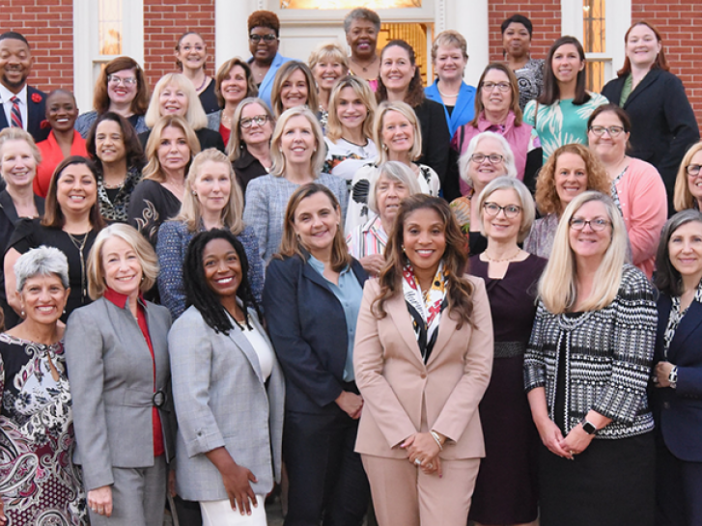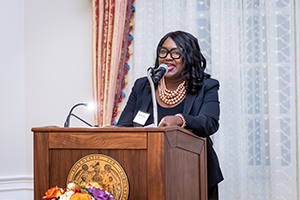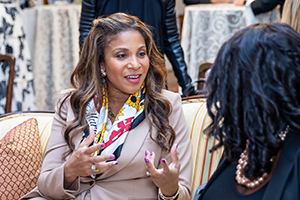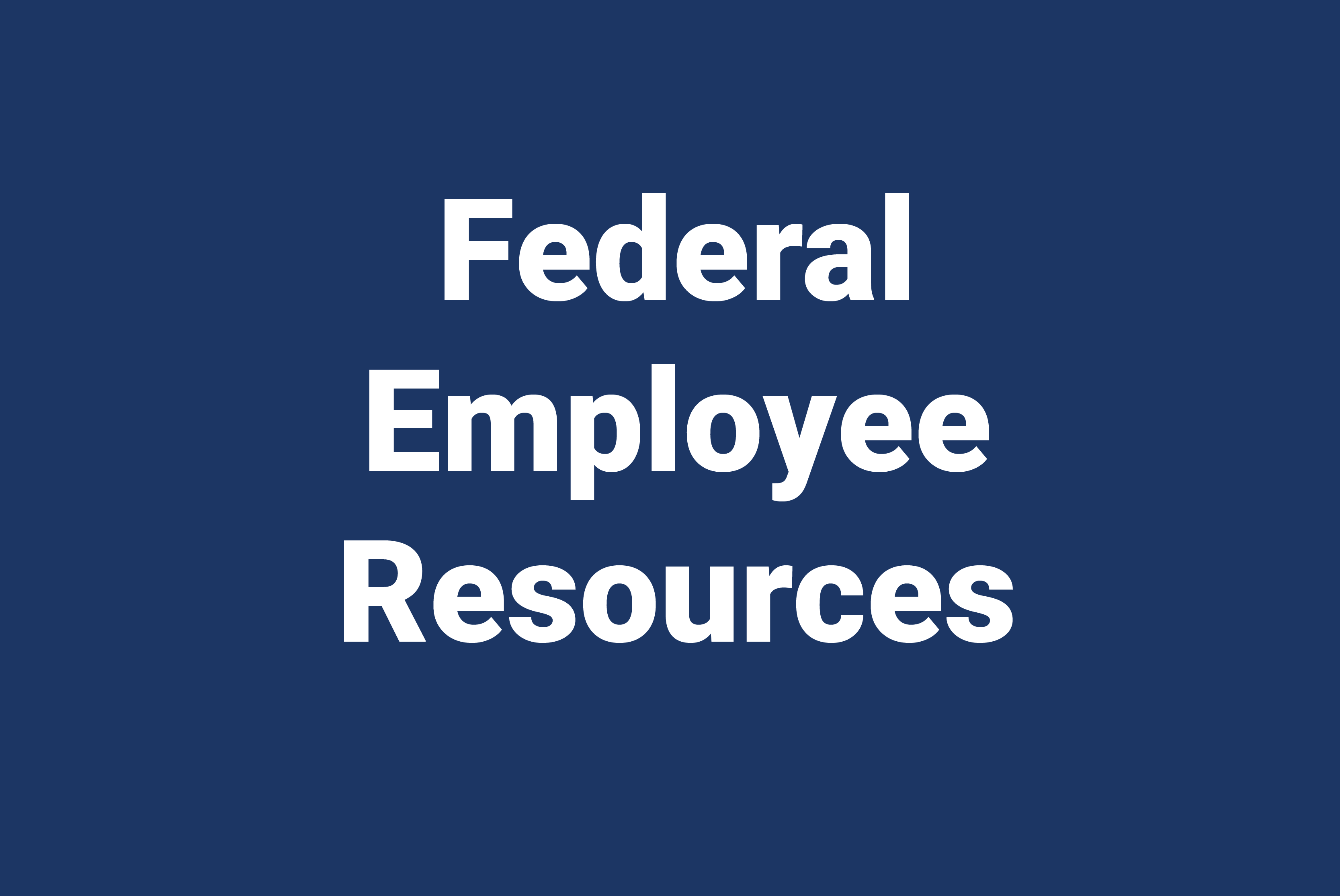
As Tawanda Saffore prepared her opening remarks for an intimate Women United event focusing on the importance of early childhood education and hosted by Maryland’s First Lady Dawn Moore at the Governor’s mansion, she reflected on the challenges she faced as a young, single mom raising her daughter in Baltimore.
“Having the means to afford childcare was a big challenge for me then, and decades later, it remains a challenge for too many mothers today,” she says. “It is extremely expensive. Quality childcare today can cost $500 a week. How can parents afford it, especially when they have more than one child?”
Tawanda, along with approximately 50 other female philanthropic leaders from United Way’s Women United Membership Network, engaged First Lady Moore, a tireless advocate for women and children, in a dynamic discussion on the complex childcare challenges facing women, and highlighted United Way’s work to expand access to enriching, high-quality, education and affordable childcare.
The visit to the Governor’s mansion has been a longstanding tradition between the Governor, the First Lady, and Women United, where they showcase programs and celebrate changemakers and achievements while highlighting systemic issues impacting women.


From Cradle to Career: Completing the Education Continuum
Comprised of hundreds of female philanthropic leaders who are generous donors, active volunteers, and fundraisers, United Way of Central Maryland’s Women United boasts a legacy of more than 20 years of social impact. Members work with United Way’s community partners to drive long-term change that helps build healthy, educated, and financially stable individuals and families.
Women United supports children throughout the education continuum, including volunteer staffing for United Way’s On Track 4 Success dropout prevention program, and mentoring groups for middle and high school girls, along with fundraising and volunteering their support for United Way’s partner schools and Family Centers, which provide free or reduced cost childcare, early childhood education, and holistic, multi-generational support for parents, their children, and their families.
In 2024, Women United’s key focus areas are childcare and education. Childcare plays a crucial role in supporting women in various aspects of their lives, from being able to advance in their careers, to achieving financial stability, to furthering their education. Studies also show that children who receive early childhood education are more likely to graduate high school, complete a bachelor’s degree, and achieve higher lifelong earnings.”Our aim will be to close the gap in the education continuum through early childhood care and education,” said Linda Demmler, Women United Global Leadership Council member, and Chief Operating Officer, IBM Global Asset Recovery Services. “As you get into formal public schools, students and families have access to more resources. Prior to that, it takes money. It takes time. It takes focus. It takes access to be able to get good quality care and education for those very important formative years of our youngest children.”
The Impact of the Childcare Shortage
The personal and economic toll of inaccessible or unaffordable childcare is high. According to United Way’s Maryland ALICE (Asset Limited, Income Constrained, Employed) Report, the average cost of childcare in Central Maryland for two children is $1,800/month-often higher than a family’s housing costs. When parents can’t find adequate childcare, they might miss work, get fired, or choose to leave the workforce entirely. And lack of access to well-structured, quality early education can negatively impact development and cognitive growth. The situation has gotten worse in recent years.
According to a recent U.S. Chamber of Commerce report, 58% of women leave work because they cannot find childcare-and 25% leave their jobs because they cannot afford it. Locally, Maryland women saw a decline in labor participation from 2019 to 2021. The most commonly cited reasons included taking care of their families, including childcare. ReadyNation reports that it costs employers $1,640 on average in lost revenue and hiring costs for one working parent due to insufficient childcare.
“Data and research show us how critical childcare is to both child development and to empowering women,” said Jennifer LaFrance, Vice President of Development for United Way of Central Maryland. “Women are dropping out of the workforce and are making very difficult choices they shouldn’t have to make, and if they don’t have access to early quality educational childcare, it does not set up their children for success by the time they get to elementary school.”
At seemingly every corner, the community faces major childcare hurdles. The childcare crisis disproportionately affects women of color. In 2021, according to The Annie E. Casey Foundation, two-thirds of Black children (64%), and 42% of Hispanic children lived in single-parent households. Often faced with no other alternative, family members help with childcare, which can lead to increased stress and economic strain.
The number of family childcare providers in Maryland shows a projected decrease of about 32% from 2022 to 2026. Licensing specialists are overworked and understaffed in all regions of the state. From January 2020 to November 2022, nearly 900 licensed childcare programs closed. Nationally, since February 2020, the childcare workforce has lost 88,000 jobs, or 8.4% of its pre-pandemic workforce.
Voicing Support for Legislation to Break Down Childcare Barriers
When childcare providers can’t staff to capacity, it affects children, parents, employees and employers, and our local economy. Staffing shortages mean longer waitlists, fewer slots for children, lost income for employees, reduced operating hours, and sometimes, even the closure of centers.
Women United members joined hands with United Way staff, volunteers, and families for a special Advocacy Day at the Maryland Statehouse to voice their support for legislation designed to break down existing barriers to childcare by reducing the turnaround time for background checks-which can sometimes take months-for qualified staff in Maryland childcare centers.”Parents can’t put their kids into childcare centers because providers are still waiting for their background checks to be completed,” Demmler said. “We are advocating for legislation to drive the necessary change that enables the providers as well as parents and communities to succeed.”
Diversity is Top Priority in 2024 and Beyond
In 2024, Women United will continue prioritizing diversity to attract other women leaders of color such as Saffore and elevate enrollment and engagement of younger members. This dynamic approach seeks to not only gain a better understanding of community needs but also to identify and implement innovative ways to engage women from all segments of the community.
“The Women United of today looks different than the Women United of 10 years ago,” said LaFrance. “We are very intentional about outreach to younger women, to women of color, and making sure they are reflected in our leadership roles, and that we are listening to their voices.”
Saffore joined Women United in 2020 after she was invited to participate in a philanthropic leadership program. She is regarded as a natural leader who is always eager to help others.
Today, she serves on the Women United Executive Council and co-chairs the Engagement Committee, organizing and leading events to actively recruit and engage members.
“Tawanda has been amazing. She is a natural leader,” Demmler said. “She is one of those people who walks into a room and makes everyone feel good about themselves. I think it’s because she truly cares. She’s very interested in what other people are thinking, and how she complements what’s going on in the room. We want other dynamic women like her to join our ranks.”
Born and raised in Baltimore, Saffore attended public schools, graduating from Western High School, an all-girls high school, and Strayer University. Today, she is a Strategic Account Manager at Transamerica, and is married with two children and three grandchildren. Her daughter holds a doctorate in psychology, and her son graduated in 2020 with a degree in criminal justice.
As a recent empty nester, Saffore had more time to focus on community service and decided to support United Way due to her familiarity with them through her company’s fundraising drives. “Once I learned about all the opportunities and the giving that United Way does, I felt this was the perfect place for me to give back,” she said.
When one thinks of philanthropy, names like Bill Gates, Warren Buffett, or Mackenzie Scott come to mind. Women United launched a philanthropic development initiative for women in 2019 that re-frames the notion of philanthropy beyond the dollars and cents to engage young professionals and those, like Saffore, who have reached a life stage or milestone in their career that allows them to amplify how to give back to their communities.
“We need to redefine what philanthropy is,” Demmler says. “Philanthropy is not just about financial support. Philanthropy really is every one of us. We need people who are willing to roll up their sleeves. Not just to do the work, but to bring their point of view on communities’ needs and share their talents to further our mission.”
“Through Women United, I learned how I really could be a philanthropist and how to connect with other women who have that same passion,” said Saffore. “They just brought me in like I was part of the family. It’s been a wonderful experience!”


